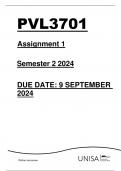PVL3701
Assignment 1
Semester 2 2024
DUE DATE: 9 SEPTEMBER
2024
, QUESTION
Against this background consider the following set of facts: Lerato owns a townhouse in Pretoria. Lerato’s best friend,
Karen, has been renting a room in Lerato’s townhouse since January 2024. Lerato has been interested in immigrating
to the United Kingdom for years. During April 2024 Lerato accepts a job offer in London. The immigration process
gets finalised swiftly and Lerato, being rushed to take up the job opportunity, leaves all her belongings behind. She
decides to come and sort out everything when she comes home to visit her family during December 2024. Karen takes
Lerato to the airport. They are very emotional while saying goodbye. Lerato hands the keys to her Mercedes vehicle
and the townhouse to Karen and runs to the boarding gate. Months go by and despite Karen regularly trying to
communicate with Lerato on , Lerato seldomly responds. Karen is sad and misses Lerato. One afternoon after taking a
walk, one of Karen’s new neighbours comes over for coffee. During their discussion, Karen mentions that she owns
the Mercedes and the townhouse. Examine the correctness of Karen’s statement. Fully substantiate your answer with
reference to the specific page(s) of your Study Guide that you consulted to answer this question.
To analyze the correctness of Karen's claim that she owns the Mercedes and the townhouse belonging to Lerato, we
must examine the nature of the rights involved—particularly focusing on the concepts of ownership, possession, and
the implications of the keys being handed over.
1. Ownership vs. Possession
According to the definitions presented in Study Unit 2, ownership is the most complete real right one can have over
a thing. Ownership confers all the rights associated with property, such as the right to use, enjoy, and dispose of it.
However, possession refers to the physical control over a property, which may or may not be accompanied by
ownership.
2. Keys Handed Over
When Lerato handed the keys to her Mercedes and townhouse to Karen, it may imply an intention to transfer
possession to Karen. However, under the current law and principles of property rights (refer to Study Unit 2), merely
handing over the keys does not equate to transferring ownership. Ownership would generally require a formal transfer
process or an agreement that meets necessary legal criteria.
3. Nature of the Relationship
Lerato’s intent seems to be based on a temporary arrangement, given that she plans to return and sort out her
belongings by December 2024. This context suggests that Lerato did not intend to permanently transfer her rights of
ownership to Karen. In Study Unit 4, the means of acquiring ownership—whether original or derivative—indicates
the importance of distinguishing ownership from merely granting possession.
4. Statutory Rights
Since Karen has been renting a room at Lerato's townhouse, this establishes a landlord-tenant relationship, which
carries specific statutory rights and duties (Study Unit 2). Karen, as a tenant, does not acquire ownership of the
townhouse simply by being granted temporary possession or looking after it; she only has a right to occupy the space
as per the rental agreement.
5. Mistaken Statement of Ownership
Given the above considerations, Karen's declaration that she owns the Mercedes and the townhouse is not legally
correct. Despite her possession of the keys and the physical control she has over the property, the ownership rights
remain with Lerato unless there is a formal agreement or legal transaction that explicitly states otherwise. Therefore,
Karen cannot claim ownership simply based on the keys being handed over, as there is no indication of a transfer of
ownership in a legal sense.
In summary, based on the discussion of the nature of rights, possession versus ownership (Study Units 2, 4, and 5),




